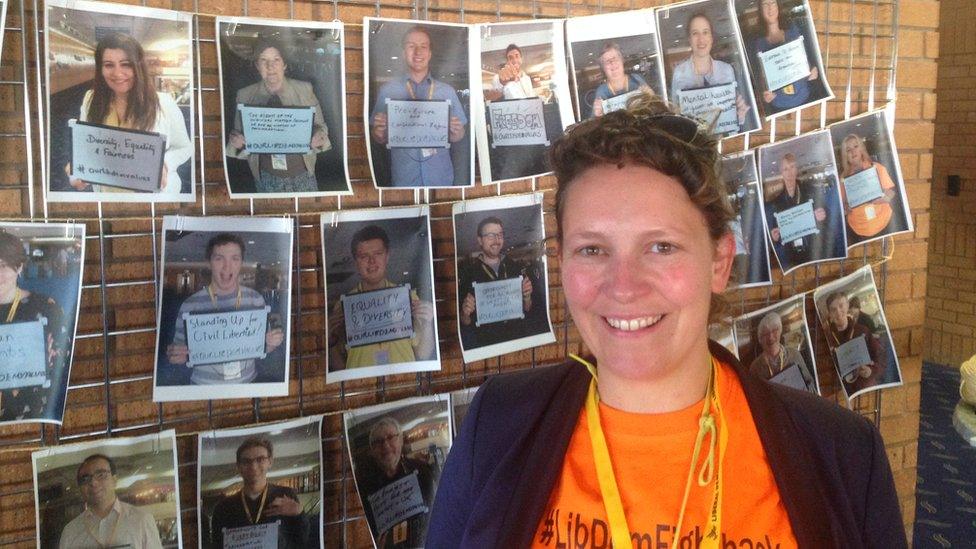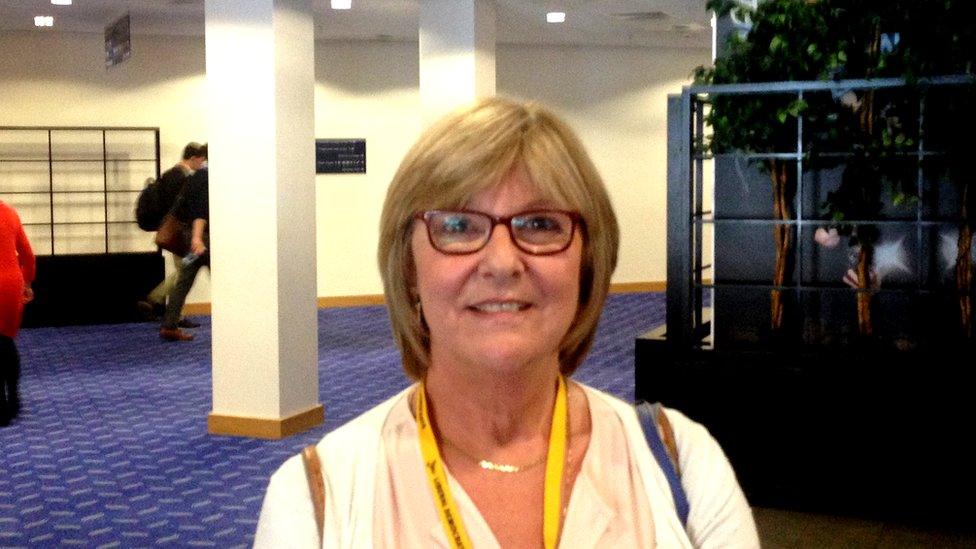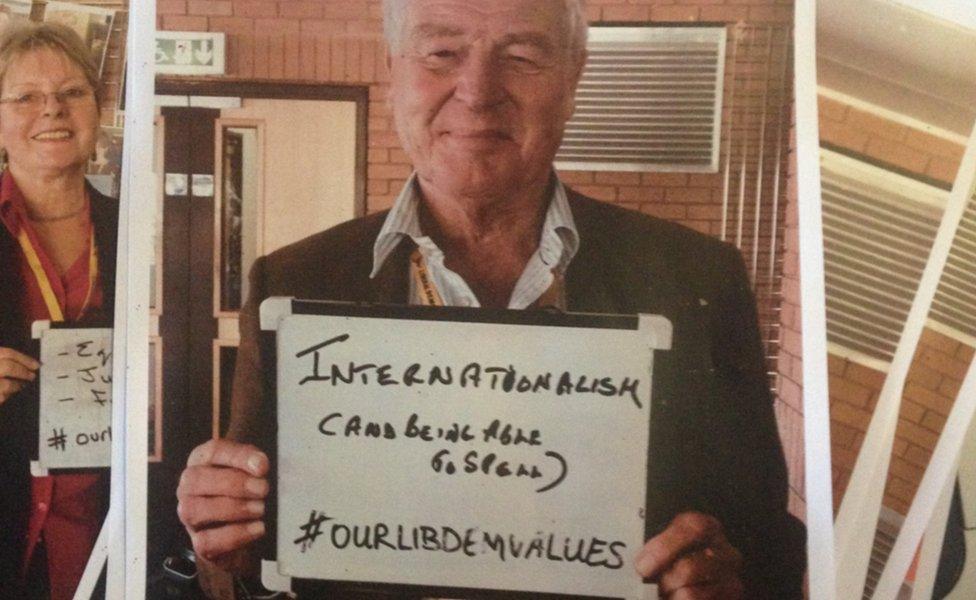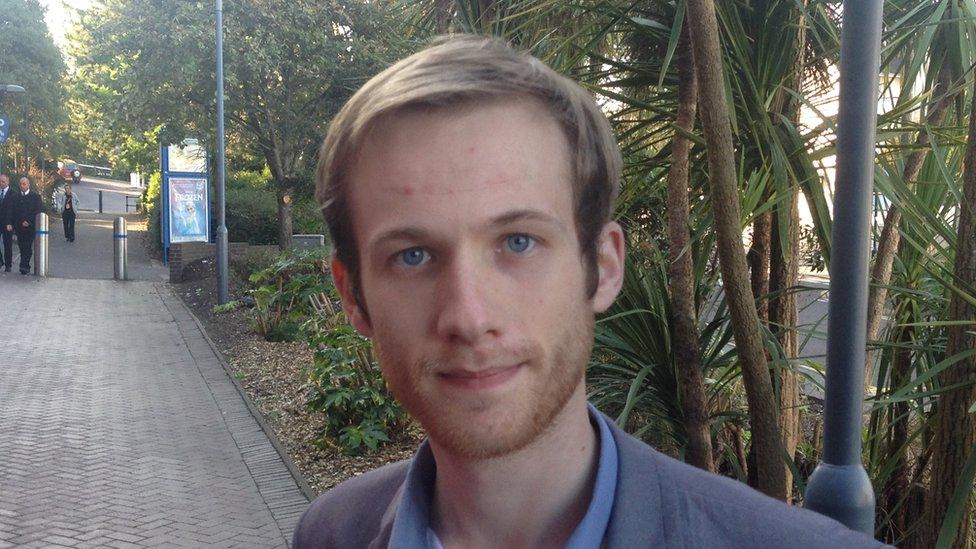Why are the Lib Dems so happy?
- Published

The Liberal Democrats have a spring in their step at their party conference. Do they know something we don't?
Lisa Northover can't stop smiling.
She spends all day photographing other smiling people. The pictures stretch out across the wall behind her. The smiling people are all holding up cards with scribbled messages - what the Liberal Democrat party means to them.
Freedom, diversity, equality of opportunity and other uplifting themes dominate.
What is going on? Isn't this the party that was meant to have been dead and buried four months ago at the general election? The party that if it had a conference at all would struggle to fill a church hall?
One of the curious things about British politics is that people tend to join parties in large numbers after they lose elections.
The Lib Dems have gained 20,000 new members since May - and many of them have made the pilgrimage to Bournemouth to take part in what the party is calling the LibDemFightback.
The key moment. they will tell you, was Nick Clegg's emotional speech on the Friday morning after the election.
Big beasts
"People suddenly realised that the country needed liberalism," says Lisa.
"I have just heard that so many times. We have to protect liberalism."

Mrs Thatcher has joined the Lib Dems
There is something unreal about the atmosphere in Bournemouth this week.
The party has not downsized its conference accommodation, but the tight security that used to be so irritating has gone.
The fringe meetings are packed with activists to the point where they are turning people away. Yet the exhibition hall, where corporate lobbyists pitched their wares, has shrunk dramatically.
The party's big beasts roam the corridors of the Bournemouth International Centre with the self-assurance of cabinet ministers. Only the smaller size of their entourage gives away their reduced circumstances.
Like a cartoon character that has run off the edge of a cliff, the party is suspended in thin air, not quite daring to look down.

Lord Ashdown leads by example
It is still acting like a party of government, briefing out carefully-costed micro policies as if they have to pass muster with George Osborne.
There is a very good reason for all of this. New leader Tim Farron is trying to pitch the party as a "credible" alternative to Jeremy Corbyn's Labour Party.
He believes the centre ground is there for the taking and has set the party a target of 100,000 members - 40,000 more than it has got now.
Like many new members you speak to, Elaine Thatcher signed up in the immediate aftermath of May's general election, so this is her first experience of planet conference.
"I was slightly appalled by how white and middle class it is," she says, but has no regrets about joining Tim Farron's happy band.
"Because I am a Buddhist it fits extremely well," she explains. "Everyone has potential".

Terry White is among those to have rejoined the party
Terry White has rejoined the party after standing as a Green Party candidate at the general election.
"There are a lot of people who have been coming back to the party. I am not the only young person who has done that. For young people what the Liberal Democrats offer is aspiration," he says.
Not everyone is relentlessly upbeat. Some have dared to stare into the abyss.
A young man at a fringe meeting earlier berated his party colleagues, including grandees Shirley Williams and Simon Hughes, for not being gloomy enough.
Didn't they realise that the party could be finished? Not just for a while, or until the electoral cycle comes round again but properly and forever.
Do not despair, cooed Mr Hughes. The Lib Dems have been here before and they have "bounced back".
But as everyone from Tim Farron downwards keeps saying, British politics is changing fast. The Lib Dems might have won 11 council by-elections since the general election but these are baby steps.
In a year's time, we will have had elections in Scotland, Wales and English local authorities. We might even have had an in/out referendum on the EU.
Will Mr Farron and his troops be in quite such a chipper mood at their next conference if they have failed to make their expected progress?
Don't bet against it.